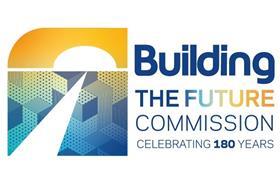The industry includes an impressive range and variety of roles – but unless you are on the inside it can be hard to know how to break in, let alone progress to the top. In this series, we talk to professionals about their often surprising career twists and turns


How long have you been working and what is your current job?
I have been working in the construction industry since July 2000. My current role at Legendre UK covers a wide range of responsibilities including analysing project tenders, supply chain management, liaising with internal and external support services, preparing submission documents.
What were your initial career ambitions? (Would your 16-year-old self be surprised at what you’re doing now?)
Ever since I was young, I have been fascinated by the architecture and infrastructure all around me – I always wanted to be able to “create” something. So my 16-year-old self would not be surprised at all as to where I have ended up!
Who or what helped you to get to where you are today?
My parents always reminded me that I was working “for myself”, so that has been my key focus. I have worked hard over the years towards achieving my masters degree in civil engineering, which has supported the opportunities I have today.
Did your choice of subjects/qualifications in school/education help or hinder your ability to get a job in the sector?
A lot of subjects at school inspired me, but I must admit I had a soft spot for the bridges study (civil engineering) class, which inspired me to pursue this career path. However, in my university curriculum it would have been helpful to learn more about how to price a building, not just design it. Being able to estimate construction costs is a key element of the job and should be reflected in the curriculum.
Have you had to overcome any barriers to get where you are today?
Others might say that being a woman in the construction industry can be a barrier, but I think it might even be an advantage these days. Companies and universities are actively promoting women in the sector and striving for more gender balance. When I graduated, my university course comprised only 18% women – I’d be interested to see the percentage now!
What are the best and the hardest parts of your job?
The best part is the diversity of tasks I do and the interactions I have with such a wide range of stakeholders. The construction industry thrives on teamwork and I am a social person, so being part of a strong team is important to me. It is brilliant to work with diverse groups on each of my projects.
What do you know now about the industry that you wish you had known when you were at school?
This sector comes with a lot of challenges, as it is directly impacted by economic context. Having said that, the industry is always active thanks to new technology and the constant demand, and that provides a sense of security to those working in it.
Working with fixed budgets and schedules can also be challenging. Owners, designers and contractors often have unrealistic expectations of how much can be accomplished within a fixed budget, or how quickly the work can be finished. This can put a lot of pressure on the team to deliver to these standards, but these potentially difficult situations become easier as you gain more experience.
As a new starter, what most surprised you about the industry?
The success rate in winning a new project is not as high as I assumed it would be – I would say circa 10-20%. That means that you win one or two projects out of 10! Submitting a tender is a process that requires a lot of effort, and you often have to find motivation to keep going.
What advice would you give someone coming through the school system now about choosing a construction-related career?
Beyond mathematical and analytical skills, construction estimators also need strong communication skills, as the construction industry is highly collaborative.
Don’t hesitate to apply for an internship in a construction company. This can give you a more accurate vision of the estimator’s role, as well as the other positions that are available to you in the sector.
What one thing would you change to make it easier for someone to find the right career in the sector?
The construction and education sectors should work together to promote the career paths available to young people in our industry. Organising building site visits for students would inspire exploration of the sector and showcase the vast opportunities and routes available, including apprenticeships.





















No comments yet